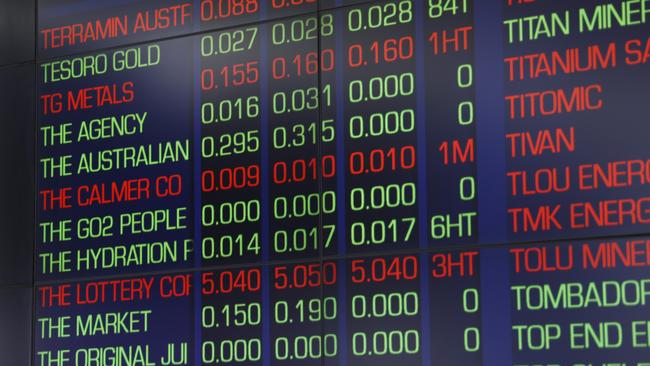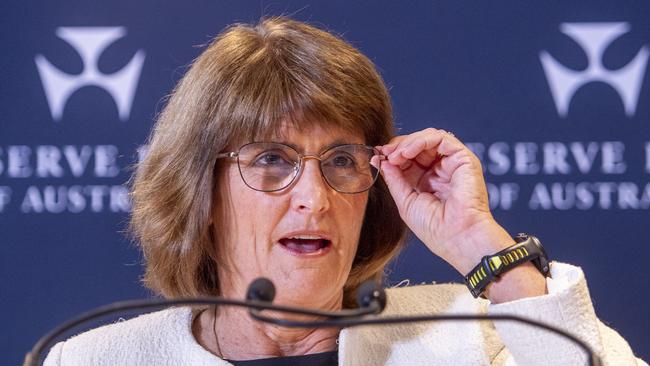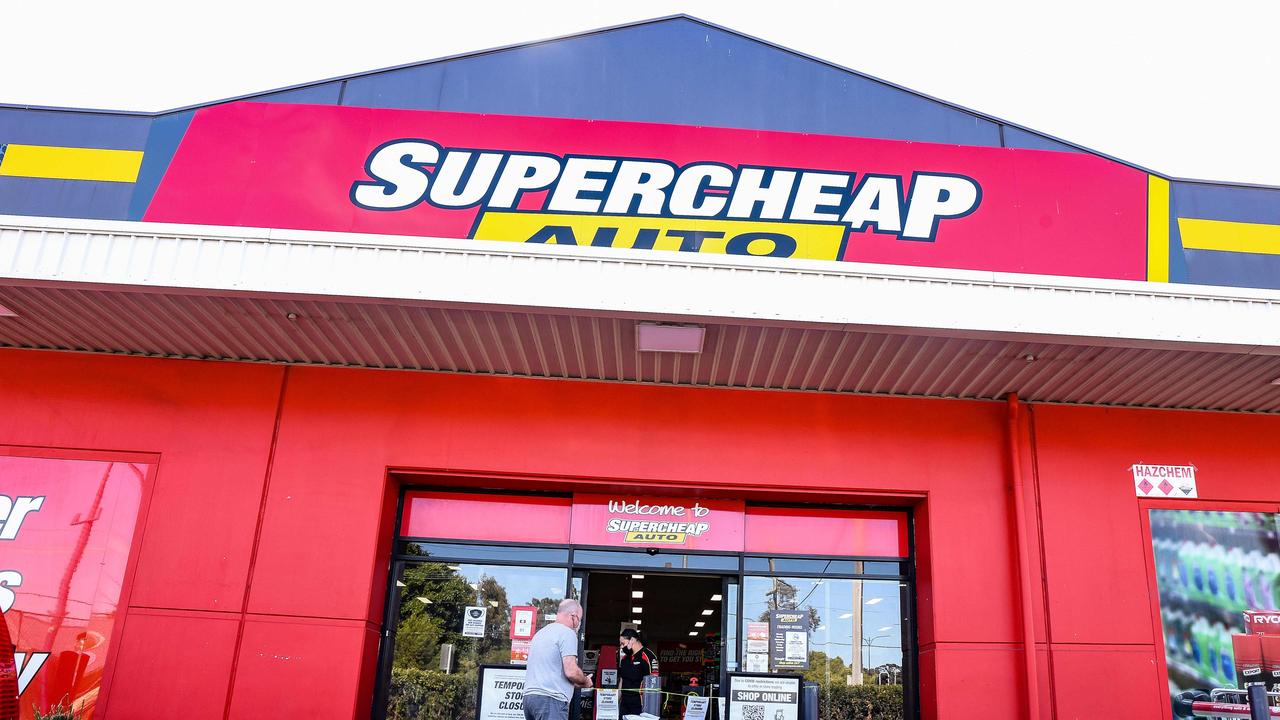ASX 200: RBA minutes show CPI pressure; St Barbara tanks on PNG tax bill; Arcadium-Rio deal nod
Domestic shares closed higher after the release of minutes from the RBA’s last meeting for 2024, which received some support from the IMF overnight. SBM hit with PNG tax bill.

Business
Don't miss out on the headlines from Business. Followed categories will be added to My News.
The ASX 200 index closed 0.2 per cent higher to 8220.90 points ahead of the Christmas break.
Property stocks performed best on Christmas Eve, with the real estate index closing 0.8 per cent higher, the healthcare index came a close second.
Heavyweight banks reversed earlier losses to close 0.3 per cent higher while the miners shed 0.3 per cent.
Subdued and flat trading early came after the release of the minutes from the RBA’s last meeting in December at 11.30am AEDT, which noted “underlying inflation was still too high, underpinned by persistently high services price inflation”.
The International Monetary Fund’s latest assessment of the Australian economy and positive US trading had underpinning opening trade sentiment.
Among notable movers, mining giant Rio Tinto (RIO) is shed 0.8 per cent to $116.16 after its US takeover target Arcadium Lithium said it had obtained all requisite shareholder approvals for the near-$10bn deal.
DataRoom reported in October how the lithium deal is a bargain for Rio.
The vote shifts the focus to how the deal will be funded and any approval hurdles in the US based on Chinese state owned-entity Chinalco’s 14.9 per cent stake in Rio.
The proposed transaction is still expected to close in mid-2025, subject to the receipt of remaining regulatory approvals and other closing conditions.
Meanwhile shares in miner St Barbara (SBM) came under significantpressure, closing 34.4 per cent lower to 20c over a huge tax bill delivered to it by the Papua New Guinea government related to its Simberi gold operations.
Its subsidiary, Simberi Gold Company, has been notified of the PNG Internal Revenue Commission’s assessments relating to dividend withholding tax and income tax totalling $PGK523.1m ($206.6m), St Barbara told investors after market close on Monday.
The company is “continuing to urgently review and consider” the IRC Correspondence, but at this stage strongly disagrees with the basis for the assessments and analysis applied and Simberi Gold intends to lodge a formal and extensive objection within the 60-day objection period.
Uranium explorer Paladin (PDN) closed down 3.2 per cent to $7.55 after completing its acquisition of Canada’s Fission, which is subject to a number of strict conditions aimed at preventing Chinese influence.
In other updates, Avita Medical (AVH), the US-based wound care company listed on the ASX, came back after experiencing a 6 per cent share price spike to $4.03 after the US Food and Drug Administration granted approval for its Recell Go mini product. AVH finished trading up 3.4 per cent to $3.94.
The FDA’s pre-market approval supplement is for the line extension of its Recell GO system. The mini disposable cartridge is designed specifically to treat smaller wounds up to 480 sq cm compared to the standard cartridge, which treats an area of 1920 sq cm.
“Recell Go mini addresses a critical need in the full-thickness skin defect market, which includes a high volume of smaller wounds,” the group told investors. After-hours US trading showed an 8 per cent jump in its Nasdaq trading price, pointing to a potentially sparkly Christmas Eve session in both time-zones.
The Aussie dollar was near US62.37c just before 3pm AEDT.
“There’s a high chance of a pretty slow day for the region and an uneventful rest of the week as a high proportion of the markets log off for the holidays,” Capital.com’s senior financial market analyst Kyle Rodda said. Australian markets will get a trove of information in the RBA minutes, which remain pertinent in light of its dovish shift.
Trading on the ASX closed at 2.10pm AEDT ahead of the Christmas Day and Boxing Day closures.
Cryptocurrency market leader bitcoin is trading below $US95,000 – a big drop from its $US108,000 record high last week.
US trading and the IMF’s Aus report
On Wall Street, the S&P 500 index closed up 0.7 per cent and the technology-focused Nasdaq index rose about 1 per cent, while the Dow Jones index climbed 0.2 per cent.
Among the standout US stocks were AI chipmakers Broadcom, Advanced Micro Devices and Nvidia – all up more than 3 per cent.
Shares in News Corp, owner of The Australian, also rose in US trading as investors reacted to its blockbuster deal to sell Foxtel to sports streaming group DAZN.
US 10-year bond yields settled higher near 4.59 per cent.
Meanwhile, the International Monetary Fund has backed the RBA’s restrictive rates stance and called for fiscal policies that avoid “an expansionary stance and complements monetary policy’s disinflation objective”.
“With significant uncertainty surrounding the macroeconomic outlook, the balance of risks is tilted to the downside,” the IMF said.

Growth is projected to pick up gradually, from 1.2 per cent in 2024 to 2.1 per cent in 2025.
Domestically, persistent labour market tightness, stronger than expected fiscal impulses and lower spare capacity than currently assessed could contribute to stalling the disinflation process, potentially leading to higher-for-even-longer interest rates that adversely impact consumption and investment, the IMF said.
“Australia remains on a narrow path to a soft landing, but risks are tilted to the downside.”
The IMF concluded that near-term policies should focus on managing the final descent of inflation to target, while nurturing growth.
It also expected inflation to sustainably return to the RBA’s target range of 2-3 per cent only by the end of 2025, “while a potential stall in disinflation poses a significant risk”.
“In this context, the current restrictive monetary stance is appropriate, and needs to be supported by fiscal policy that avoids an expansionary stance and complements monetary policy’s disinflation objective.”
The IMF said a “comprehensive policy package is essential” to tackle Australia’s housing affordability crisis, focusing on increasing the construction workforce, relaxing zoning regulations, advancing initiatives to boost new housing supply, and re-evaluating property taxes and stamp duty.
More Coverage
Originally published as ASX 200: RBA minutes show CPI pressure; St Barbara tanks on PNG tax bill; Arcadium-Rio deal nod



